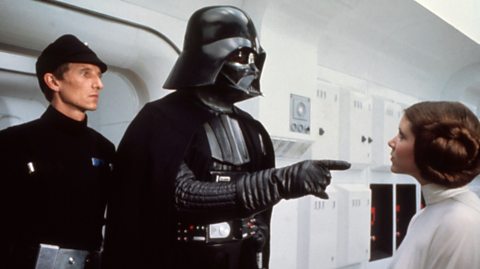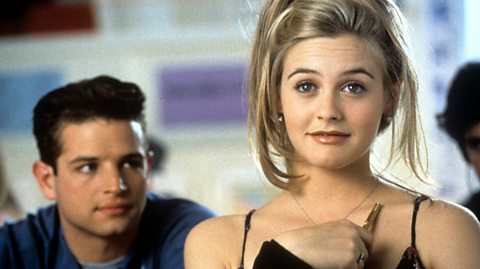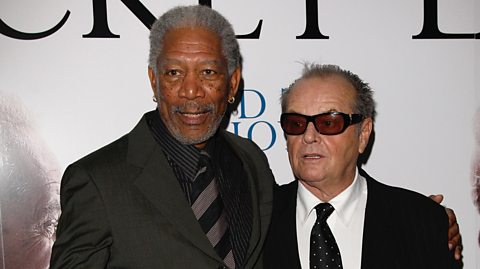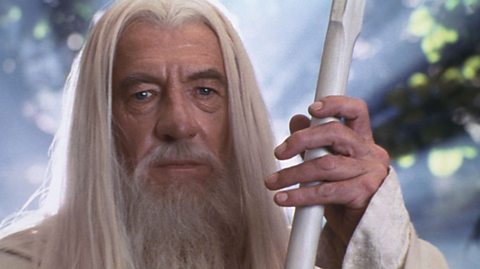The sayings we use everyday have lots of different, and sometimes unusual, origins. Some come from foreign languages, others from literature or even advertising.
But a surprising number have become more widely used from a fresher, modern source: movies and TV. From Star Wars to Seinfeld, entertainment has helped to showcase language we may not have used as much had it not been for the big and small screen.
BBC Bitesize takes a look at seven of those words and phrases.

‘The Dark Side’ (Star Wars)
If you’ve ever used the phrase ‘the dark side’ as in “they’ve turned to the dark side”, you might not know it but you’re probably quoting one of the most famous science fiction movies of all time.
The phrase was popularised thanks to Star Wars and refers to the dark side of the force. The force is a mysterious power that can be used for both good and evil.
Using the force for evil, or turning to the dark side, was referred to first in the first trilogy of movies but is most memorably explained by Yoda in Star Wars: The Phantom Menace (1999) when he tells a young Anakin Skywalker: “Fear is the path to the dark side. Fear leads to anger. Anger leads to hate. Hate leads to suffering.”

Paparazzi (La Dolce Vita)
The word ‘paparazzi’ (the singular is ‘paparazzo’) refers to the controversial photographers who chase celebrities in order to sell their photographs to newspapers.
It has its origins in the classic Italian movie La Dolce Vita, which was released in 1960. The film, directed by Federico Fellini, tells the story of a disenchanted gossip columnist, Marcello Rubino, who is always accompanied by his photographer friend, who was called Paparazzo.
The character’s name soon became associated with his job. In 1961, Time Magazine used the word in an article and it soon became common usage.

‘My bad’ (Clueless)
The phrase ‘my bad’ is a modern way of saying ‘my fault’. It has its underground origins in high-school basketball, in the 1970s and 1980s. But it was popularised by the movie Clueless in 1995.
The film introduced audiences to ‘Valley Girl’ slang, named after the young people who lived in Southern California. These phrases included sayings such as ‘as if!’ as a way of expressing disbelief.
The movie’s main contribution to modern vocabulary was ‘my bad!’ which star Alicia Silverstone exclaims when she accidentally almost runs over a cyclist during her driving test.

‘You’re toast!’ (Ghostbusters)
Saying someone or something is ‘toast’ means they’re doomed or ‘over’ in some way. The expression was popularised when it was used in the 1984 smash hit Ghostbusters.
In the movie, star Bill Murray to speak in public without preparing what to say the line, ‘This chick is toast!’, when the spook-busting gang confronted Sigourney Weaver, who had been transformed into the demon Zuul. The phrase slowly wormed its way into popular culture, appearing in print in The New York Times a decade later in 1997.

‘Googled’ (Buffy The Vampire Slayer)
These days we use the verb ‘googled’ to say that we’ve looked something up on the famous search engine (or even another). Google had been used as a verb as far back as 1998 when Google co-founder Larry Page used it in an email to his staff.
But the word ‘googled’ shot to prominence when it was first used on the popular vampire drama Buffy the Vampire Slayer. The term was used in an episode which first aired in 2002.
Soon it was a word in common usage. Not long after the episode was released, the American Dialect Society labelled the verb, 'google', the most useful word of 2002 and in 2006 it appeared in The Oxford English Dictionary.

‘Bucket List’ (The Bucket List)
As we’ve seen, words and phrases are sometimes introduced into common usage when a character uses them in a film or TV show. But in this case it was the title of a film that helped a phrase catch on.
A ‘bucket list’ is a list of things someone wants to do before they die. While working as a barman in Los Angeles, aspiring screenwriter Justin Zackham wrote ‘Justin’s list of things I want to do before I kick the bucket’, and the first item on his list was to get a movie produced at a major studio.
The screenplay he wrote, about two men who leave hospital to do all the things they want to do, was titled The Bucket List and after the movie was released, the idea became widely known.

‘Regifting’ (Seinfeld)
‘Regifting’ is when somebody receives a present they don’t actually want, and sneakily get rid of it by giving it as a gift to somebody else. There’s a lot of debate about whether this is a rude thing to do, or not.
The word was popularised in an episode of the popular TV sitcom Seinfeld that first aired in 1995. In it, comic confusion about a label maker given as a present led to a character accusing another of ‘regifting’
The practice was obviously more common than people thought, and the word soon caught on.
This article was published in December 2024
Looking for quizzes, amazing stories and fun facts?
Bitesize Topical has it all!

Six movie locations across the world that boosted tourism
The Lord of the Rings' Hobbiton, the enticing sands of The Beach and a Scottish town immortalised in Local Hero.

Six celebrities who’ve made unexpected cameo appearances in the movies
Grab some popcorn and take a look at the surprising cameos celebrities have made in films

Five movie stars who’ve never won an Oscar
Sir Ian McKellen and Amy Adams are among those who have never taken home an Oscar.
